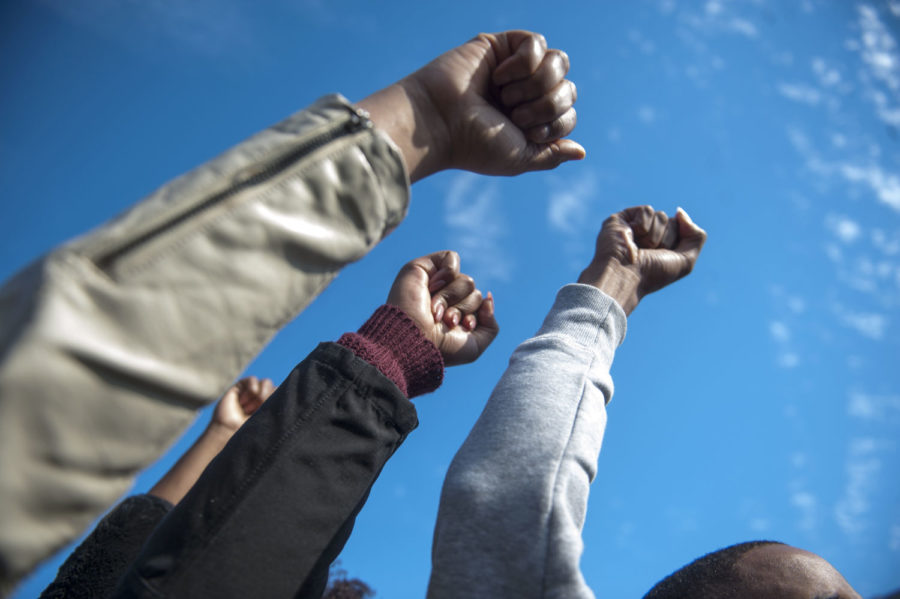University of Missouri interim president calls campus protests part of struggle on race
Protesters raise their fists to celebrate Tim Wolfe’s resignation during the Concerned Students 1950 protest on Monday, Nov. 9 2015, in Columbia, Mo. (Michael Cali/San Diego Union-Tribune/TNS)
June 21, 2016
The interim president of the University of Missouri system said the protests at the Columbia campus last fall were an extension of a centuries-old continuum of racial discord in the state and the country.
But Michael Middleton told the National Press Club that Mizzou can also be a national example as it struggles to deal with the problems exposed last fall.
In an hourlong speech and question-and-answer session, Middleton also defended the firing of controversial professor Melissa Click. Middleton said he expected to be in his job at least until the end of the year, as a national search for a permanent system head continues.
Advertisement
In one of several blunt answers to questions about challenges facing the flagship Columbia campus, he described prospective freshman fall enrollment there as “grim,” and said the campus is bracing for a $30 million drop in tuition from a smaller first-year class.
Middleton said that as a parent, he, too, would have second thoughts about sending a child to a campus “that I thought was violent and in total disarray.”
“The fact is the University of Missouri-Columbia is not violent and not in total disarray,” he said.
“I am optimistic,” he said. “We have been around 177 years. We have been through problems, ups and downs … We generally come back stronger.”
While describing last fall’s unrest as a “perfect storm” that extended beyond race, Middleton couched the protests and recoil as part of a lingering national story.
Speaking before C-SPAN cameras, he was asked a question that framed Missouri as a one-time slave state that prompted the 1857 Dred Scott Supreme Court decision denying citizenship to freed slaves.
Middleton, an African-American who grew up in a segregated Mississippi in the 1950s and 1960s, paused before answering. He said that knowing the history of the state, that when he was in college in the 1960s, in the then-sports rivalry with the University of Kansas, “I am on Kansas’ side, you know.”
Advertisement*
“Missouri has been a hotbed for centuries, and it is reflected in Missourians’ opinions and positions with regard to what happened at the university,” said Middleton, who received his undergraduate and law degrees at the Columbia campus.
“We have got some very, very progressive people — very, very supportive of the students and supportive of what happened, and eager to make the changes,” he said.
“But we have got a lot of people who think that it was out of control. I have heard phrases like, ‘animals running the zoo,’ or ‘inmates running the asylum,’ ” Middleton continued. “Just bitter, angry people over the fact that this happened in the first place.
“So you have got a variety of positions in Missouri, as I think Missouri has had since the Civil War, when brothers were fighting brothers.”
It’s a “fundamental flaw in this country that grows out of declaring all people equal and endowed by their creator with inalienable rights, but (at) the same time … black people were held in bondage.
“What you are seeing at Missouri and college campuses across the country is a reflection of that tension, that imperfection in our union,” he concluded. “And we need to find a solution. What better place to do that than a university?”
On Saturday, the American Association of University Professors voted to censure the University of Missouri-Columbia for its firing of controversial communications professor Click, whose “I need some muscle” call against a student reporter went viral on the Internet during the campus demonstrations.
Middleton said he was not surprised at the censure vote, but he defended the university’s decision to fire Click.
“I thought Dr. Click lost control in a very heated situation,” Middleton said. Her firing, he said, had nothing to do with Click’s academic freedom.
“The AAUP couched their sanctions in those terms,” Middleton said. “But they have a job to do themselves, and they did it. We will have to live with it and work to get off this censure list as soon as possible.”
(c)2016 St. Louis Post-Dispatch
Visit the St. Louis Post-Dispatch at www.stltoday.com
Distributed by Tribune Content Agency, LLC.
Advertisement








